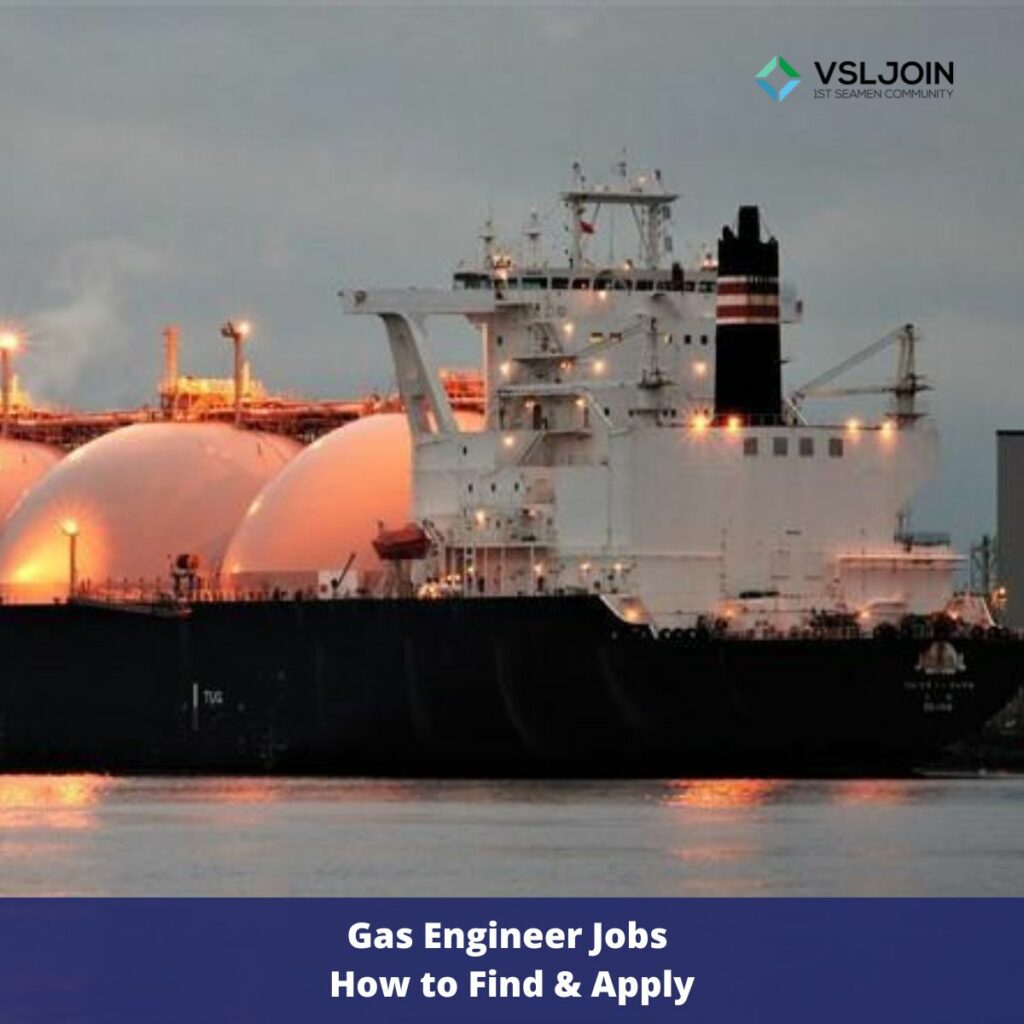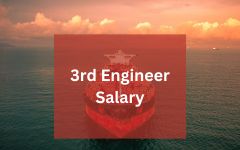Finding and Applying for Gas Engineer Jobs in Shipping
Are you a skilled gas engineer looking for exciting job opportunities in the maritime industry? The maritime sector offers a wide range of employment options, and gas engineer jobs play a vital role in ensuring the smooth and efficient operation of ships and offshore facilities. In this comprehensive guide, we will explore how to find and apply for gas engineer jobs in the maritime industry, providing you with valuable insights and tips to kick-start your career at sea.
Gas Engineer Jobs - Understanding the Role
Responsibilities and Duties of a Gas Engineer

- Gas System Management: A gas engineer is primarily responsible for managing and maintaining gas-related systems on board ships and offshore facilities. This includes overseeing the operation of gas turbines, boilers, and other associated equipment.
- Routine Inspections and Maintenance: gas engineers conduct regular inspections of gas systems to ensure their proper functioning and compliance with safety regulations. They perform maintenance tasks, such as cleaning, lubricating, and replacing components, to prevent breakdowns and ensure optimal performance.
- Troubleshooting and Repairs: In the event of system malfunctions or failures, gas engineers are responsible for identifying the root cause of the problem and implementing necessary repairs. This may involve diagnosing electrical or mechanical faults, replacing faulty parts, or coordinating repairs with external contractors.
- Safety and Compliance: gas engineers play a crucial role in ensuring the safety of gas systems on board. They adhere to strict safety protocols, conduct risk assessments, and implement preventive measures to mitigate potential hazards. They also ensure compliance with relevant international standards and regulations governing gas systems in the maritime industry.
- Documentation and Reporting: gas engineers maintain accurate records of maintenance activities, inspections, and repairs. They prepare reports detailing the status of gas systems, including any identified issues and recommended actions. These records contribute to the overall maintenance and operational efficiency of the vessel or facility.
Importance of Gas Engineers Jobs
- Safety and Environmental Protection: Gas systems, such as boilers and gas turbines, are critical components in maritime operations. Proper management and maintenance of these systems by gas engineers help ensure the safety of personnel and the protection of the environment. They mitigate the risk of gas leaks, fires, or explosions that can pose significant threats to the vessel, crew, and marine ecosystems.
- Operational Efficiency: Well-maintained gas systems contribute to the overall efficiency and performance of ships and offshore facilities. Gas engineers optimize system operations, monitor energy consumption, and identify opportunities for improving fuel efficiency. This results in cost savings and reduced environmental impact.
- Compliance with Regulations: The maritime industry is subject to strict regulations and standards related to gas systems. Gas engineers ensure compliance with these requirements, such as those set by the International Maritime Organization (IMO) and classification societies. Compliance helps maintain the vessel's operational status, avoids penalties, and ensures the safety of everyone on board.
- Emergency Response Preparedness: In the event of emergencies or contingencies involving gas systems, gas engineers are trained to respond quickly and effectively. Their expertise in troubleshooting, repairs, and system shutdown procedures plays a critical role in minimizing risks, preventing further damage, and ensuring the safety of the vessel and its occupants.
- Continuous Improvement and Innovation: Gas engineers are constantly seeking ways to enhance the performance and reliability of gas systems. They stay updated with the latest technologies, industry trends, and best practices. Their knowledge and expertise contribute to the development and implementation of innovative solutions that improve overall operational efficiency and safety standards in the maritime industry.
Conducting a Job Search - Gas Engineer Jobs
- Maximizing Opportunities: Conducting an effective job search increases your chances of finding suitable gas engineer jobs in the maritime industry. It allows you to explore a wide range of options and discover potential opportunities that align with your skills and career goals.
- Targeting Specific Roles: An effective job search helps you target specific roles as a gas engineer, allowing you to focus on positions that match your expertise and experience. This increases the likelihood of securing a job that aligns with your professional aspirations.
- Saving Time and Effort: By conducting a targeted job search, you can save time and effort by avoiding irrelevant job listings. This enables you to dedicate your resources to pursuing opportunities that are genuinely relevant to your career objectives.
Gas Engineer Job Portals
- Gas Engineer Jobs: Utilize online job portals that specialize in maritime job listings to search specifically for gas engineer positions. These platforms provide comprehensive databases of available job opportunities within the maritime industry. For example, Vesseljoin is a great website to start from.
- Sea Job Listings: Search with Google by using the keyword "sea job" or "jobs at sea" to narrow down your search and find gas engineer positions that specifically involve work at sea. These listings often include roles on various types of vessels, such as cargo ships, cruise ships, offshore platforms, and research vessels.
Company Websites & Gas Engineer Jobs
- Direct Approach: Visit the websites of maritime companies, shipbuilding yards, and offshore oil and gas companies to explore potential job vacancies. Many organizations post job openings directly on their websites, providing you with the opportunity to apply directly and potentially discover unadvertised positions.
- Job Listings Sections: Navigate to the "Careers" or "Job Opportunities" sections of company websites to find specific information about gas engineer positions. These sections often provide details about job requirements, responsibilities, and application procedures.
- Subscribe to Job Alerts: Some company websites offer the option to subscribe to job alerts or newsletters. By signing up for these notifications, you can receive regular updates about new job vacancies, ensuring that you stay informed about relevant opportunities.
Gas Engineer Jobs & Networking Opportunities
- Professional Networking: Network, network, network! If you wish to connect online with other seafarers sign up and make a profile today at Vesseljoin. Vesseljoin will give you the chance to promote your profile and connect with hundreds or thousands of seafarers. You should actively engage in professional networking within the maritime industry to expand your connections and increase your chances of discovering hidden job opportunities. Attend industry conferences, seminars, and job fairs where you can meet potential employers, industry professionals, and fellow gas engineers.
- Online Networking Platforms: Utilize online professional networking platforms, such as Vesseljoin or LinkedIn, to connect with maritime professionals, join industry-specific groups, and participate in discussions. These platforms provide valuable opportunities to showcase your skills, expertise, and interest in gas engineer roles.
- Referrals and Recommendations: Leverage your professional network to seek referrals and recommendations. Inform your contacts about your job search as a gas engineer in the maritime industry and ask if they have any leads or insights. Referrals can often lead to job opportunities that may not be publicly advertised.
Registering With Maritime Recruitment Agencies
- Maritime Recruitment Agencies: Consider registering with specialized maritime recruitment agencies that have expertise in placing professionals in the maritime industry. These agencies often have access to a broad range of job openings and can assist you in finding suitable gas engineer positions.
- Submitting Your Profile: Provide the recruitment agencies with your updated resume, certifications, and other relevant documentation. They will review your profile and match you with relevant job opportunities that align with your skills, qualifications, and preferences.
- Assistance and Guidance: Maritime recruitment agencies can offer guidance and support throughout the job search process. They may provide resume advice, interview preparation, and even negotiate employment terms on your behalf.
Conducting an effective job search as a gas engineer in the maritime industry requires a proactive and targeted approach. By utilizing online job portals, exploring company websites, networking, and registering with maritime recruitment agencies, you can increase your chances of finding and securing the ideal gas engineer job at sea or in other maritime environments. Stay focused, utilize relevant keywords, and be persistent in your search efforts to maximize your job search success.
Crafting an Impressive Resume to get a Gas Engineer Jobs
Importance of a Compelling Resume for Gas Engineer Jobs
- First Impression: Your resume serves as the first impression for potential employers. A compelling resume is essential to grab their attention and showcase your qualifications and suitability for gas engineer positions.
- Highlighting Relevant Skills: A well-crafted resume allows you to highlight your skills, experience, and achievements specifically related to gas engineering in the maritime industry. This helps employers quickly identify your suitability for their job openings.
- Differentiating Yourself: An impressive resume sets you apart from other candidates competing for gas engineer jobs. It demonstrates your professionalism, attention to detail, and ability to effectively communicate your qualifications.
Tailoring the Resume for Gas Engineer Jobs
- Job-Specific Keywords: Incorporate relevant keywords throughout your resume, such as "gas engineer jobs". These keywords help optimize your resume for online searches and indicate your alignment with the specific job requirements.
- Professional Summary: Begin your resume with a concise professional summary that highlights your experience, expertise, and key qualifications as a gas engineer. Tailor this section to emphasize your suitability for gas engineer roles in the maritime industry.
- Skills Section: Create a dedicated skills section to showcase your technical skills and competencies as a gas engineer. Include skills such as gas system management, maintenance and repairs, troubleshooting, safety compliance, and any specialized knowledge or certifications relevant to the maritime industry.
- Relevant Experience: Provide a detailed account of your relevant work experience, emphasizing roles where you have worked as a gas engineer or in related positions within the maritime industry. Describe your responsibilities, accomplishments, and notable projects that demonstrate your expertise and contributions.
- Education and Certifications: Include your educational background, highlighting any degrees or certifications that are relevant to gas engineering. This can include degrees in engineering, maritime studies, or certifications in gas system operations or safety compliance.
- Additional Sections: Consider including additional sections, such as professional affiliations, training programs, and language proficiency, if they are relevant to your gas engineer career or the specific requirements of the job you are applying for.
Showcasing Achievements and Relevant Projects - Gas Engineer Jobs
- Quantify Achievements: Whenever possible, quantify your achievements to provide tangible evidence of your contributions. For example, highlight any improvements in gas system efficiency, cost savings, or successful implementation of safety measures.
- Project Highlights: If you have worked on specific gas engineering projects in the maritime industry, include them in your resume. Describe the scope, challenges, and outcomes of these projects, emphasizing your role and contributions.
Highlighting certifications and training programs
- Certifications: List any relevant certifications you hold, such as gas system operation certifications, safety training certificates, or maritime industry certifications. These demonstrate your commitment to professional development and your readiness for gas engineer roles.
- Training Programs: Include any specialized training programs or workshops you have completed related to gas engineering or the maritime industry. This showcases your continuous learning and industry-specific knowledge.
References & Gas Engineer Jobs
- Professional references: Consider including references from previous employers, supervisors, or colleagues who can vouch for your skills and qualifications as a gas engineer. Obtain their consent beforehand and provide their contact information along with a brief description of their professional relationship to you.
- Academic references: If you are a recent graduate or have limited work experience, you can include references from professors or instructors who can speak to your academic achievements, work ethic, and potential as a gas engineer.
Applying for Gas Engineer Jobs
Researching job requirements and qualifications
- Job Descriptions: Read job descriptions carefully to understand the specific requirements and qualifications sought by employers for gas engineer positions. Pay attention to desired skills, experience levels, educational background, and any additional certifications or licenses that may be necessary.
- Maritime Industry Knowledge: Familiarize yourself with the unique aspects of the maritime industry, including safety regulations, industry standards, and technological advancements. This knowledge will enable you to align your application with the specific needs and challenges of gas engineering in a maritime setting.
- Networking and Informational Interviews: Reach out to industry professionals or gas engineers currently working in the maritime sector. Engage in informational interviews to gather insights about job requirements, career paths, and key skills sought by employers. This information will help you tailor your application materials accordingly.
Preparing application materials - Gas Engineer Jobs
- Resume: Review and update your resume to reflect your qualifications, skills, and experiences as a gas engineer. Tailor your resume to highlight relevant achievements, projects, and technical expertise related to the maritime industry.
- Cover Letter: Craft a compelling cover letter that introduces yourself, expresses your interest in the specific gas engineer job, and highlights how your skills and experiences align with the requirements stated in the job description. Emphasize your knowledge of the maritime industry and your ability to contribute to safety, efficiency, and compliance.
- Supporting Documents: Gather supporting documents, such as copies of relevant certifications, licenses, academic transcripts, and letters of recommendation. Include these documents in your application as required or if requested by the employer.
Applying Through Online Platforms and Job Portals
- Use Vesseljoin: It does everything for you in one platform! Apply, keep track of your job applications, and network in one website.
- Online Applications: Submit your application through online job portals and company websites that feature gas engineer job listings. Follow the application instructions carefully, ensuring that you provide all the requested information and upload your updated resume and cover letter.
- Application Tracking: Keep a record of the positions you have applied for, along with their corresponding deadlines and contact information. This will help you track your applications and follow up if necessary.
Leveraging Professional Networks and Referrals
- Networking Connections: Reach out to your professional network, including industry contacts, former colleagues, professors, or mentors, who may have insights into available gas engineer jobs in the maritime industry. Inform them about your job search and inquire if they can provide referrals or recommendations.
- Referral Programs: Some companies offer referral programs where employees can refer potential candidates for open positions. If you have contacts working in maritime companies, inquire about these referral programs and ask if they would be willing to refer you for any gas engineer openings.
Follow-up and Interview Preparation
- Follow-up Emails: Send a follow-up email to express your gratitude for the opportunity to apply and reiterate your interest in the gas engineer job. Use this as an opportunity to inquire about the status of your application and to express your availability for an interview.
- Interview Preparation: Research the company thoroughly before any potential interviews. Familiarize yourself with their values, projects, and recent news. Prepare answers to common interview questions related to gas engineering, safety protocols, teamwork, and problem-solving. Additionally, be prepared to showcase your knowledge of gas systems in the maritime industry and discuss any relevant experiences or projects.






